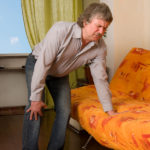By David Blyweiss, M.D., Advanced Natural Wellness
January 01, 2013
- Why germs aren’t as evil as TV commercials would have you think
- The secret threat posed by antibacterial soap
- Why water temperature doesn’t matter
Proper hand washing technique is one of the first hygiene habits every parent teaches a child.
You see it in countless public bathrooms everyday – parents waiting patiently while children lather, rinse, and dry. Or, as they get older, grilling them as soon as they emerge from the bathroom, “Did you wash?”
Then, there are the signs in bathrooms for food handlers – reminding them to wash. And countless commercials on television warning of the dangers of germs and urging you to wash them away.
Any alien landing here would think germs are the main enemy of humans. And that our hands are the battleground.
While this is the right idea – and hand washing is important – there are dangers, too. Depending on how you wash, what kind of soap you use, and how it affects your skin, you could be creating a health problem for yourself and others.
MD Exposes the Hidden Danger to Your Eyes

When your eyesight starts to fail, it's a real problem. Suddenly you can't go to the grocery store... you can't get to the doctor if you have an emergency... you can't meet your friends for dinner…
Your "regular" doctor doesn't have time to keep up with the latest research. And the same goes for eye doctors. They go to school to learn how to fit you for glasses and contacts, but have no way of preventing the damage and loss of eyesight that threatens your freedom and independence.
Let me show you something that explains a LOT about how your eyes work.
In my FREE Special Report, I'll show you a HUGE, untapped resource for your eyes that safely and naturally restores clear, effortless eyesight.
Click here to get started...
Today, I’ll bust a few prevailing – and persistent – hand washing myths. Follow these guidelines so your hand washing remains a useful practice, rather than a dangerous one.
That’s right. Dangerous. Let me explain…
Myth #1: Killing germs will keep you healthy
The prevailing notion that germs are the enemy of health is, simply put, dead wrong. What’s true is that we have a symbiotic relationship with bacteria – one that does much more good than harm. In fact, bacteria cells outnumber human cells 10-to-1.
Our entire digestive tract is lined with bacteria. Without it, we can’t break down food, extract the vitamins and minerals from what we eat, or get rid of waste.
The same is true of our skin. We have a universe of harmless bacteria covering our skin. Contrary to popular belief, this is what protects us from the harmful bacteria and viruses that make us sick. Keeping your hands clean isn’t an exercise in germ warfare. It is a practice to keep the levels of “bad” germs we pick up as we go through our day from being outnumbered by the “good” germs that keep us healthy.
Which leads me to the second dangerous myth…
Myth #2: Anti-bacterial soap or hand sanitizer works best
The World's Quickest Solution for Ending Prostate and Urinary Misery
This has recently been revealed to be one of the only real breakthroughs in prostate health.
The seeds of a strange fruit (sometimes called "Chinese Apples") hold powerful phytonutrients that are a revolution in prostate health.
In fact, UCLA and Veterans Administration research have now proved this to be true.
Not only that, but it may be the worlds quickest solution for ending prostate misery.
Simply stated, these phytonutrients represent a huge step beyond beta sitosterol, saw palmetto, and other phytosterols alone.
Simply click HERE if you want to have fast prostate relief...restful, uninterrupted sleep...no more constant "urges to go"...enhanced virility...and optimal prostate support for life.
Anti-bacterial soaps and sanitizers are on the front line of this misguided ‘war on germs’ we’re waging. And they are doing much more harm than good. These products are formulated to wipe out all bacteria… the good along with the bad. Which ends up compromising your health more than helping.
Here’s the problem…
Last year, around this time, I wrote to you about an anti-bacterial ingredient called triclosan that is not just found in soap, but in everything from toothpaste to toys to clothing. And I told you that it was dangerous for many reasons, including the fact that when it is mixed with chlorine (which is added to public water sources) and sunlight, it becomes a carcinogen. As of that issue, this product was “under review” by the FDA… and guess what, it’s still under review!
Which means it’s up to you. My advice is to use regular soap and water for hand washing, and also, to avoid using any anti-bacterial products, especially those with triclosan.
If you need an anti-bacterial product, to clean a wound for example, turn to a natural agent, first. You can find a list of antibiotic alternatives in this recent issue.
Myth #3: Always use warm water
Instructions for proper hand washing almost always include using warm or even hot water. But the truth is water temperature doesn’t matter. And in fact, cool water might even be better.
First, any water hot enough to kill germs would burn you. Which is a bad idea.
And some contend warm water is important because it rinses off more of the oils where germs can live. But when you wash off the natural oil of your skin, you leave the skin dry, and prone to cracking – a common winter complaint.
But your skin is your primary line of defense against germs. So, skin that is dry and cracked actually puts you at greater risk of getting infections. To the extent that warm water dries the skin, frequent hand washing is better done in cool water so that oils are preserved.
One last thing…
You might be tempted to resort to using gloves to protect your hands, especially against harsh chemicals when cleaning or while doing dishes. While there is nothing wrong with using gloves, bear in mind they can give you a false sense of security.
For example, without gloves, you would probably be very aware of the need to wash your hands after handling garbage or cleaning the sink with cleanser, and say, before washing the dishes.
Studies of health professionals have shown that using gloves sometimes leads to more bacterial contamination, not less. They protect your hands, sure. But they also may make you more prone to dragging bacteria around than you might without the barrier.
The most important times to wash your hands are:
- After using the toilet
- Before and after taking care of a sick loved one and before and after treating any injury that involves broken skin.
- Changing the baby’s diaper
- Touching any pet waste
- Before and after handling food, especially raw chicken or other meat
- After taking out the garbage
If you don’t know how long to wash your hands, (and please don’t forget to wash in-between your fingers) sing “Happy Birthday” twice while soaping/rinsing… that’s good enough.



![[HEREISPOSTTITLE]](https://advancednaturalwellness.net/wp-content/plugins/wordpress-23-related-posts-plugin/static/thumbs/2.jpg)


